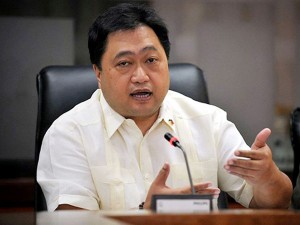Cabinet group redraws mining blueprint
A group within the Cabinet will prepare a draft executive order to enable the government to get a bigger share of mining revenues, according to the finance department.
Finance Secretary Cesar V. Purisima said in a briefing that President Aquino himself had tasked the group to review the existing mining policies.
The group includes the Executive Secretary and the heads of finance, environment, and local government, among others.
“The Department of Finance’s focus is that the Philippines gets its fair share of revenue,” Purisima said. “In the past few years, laws and incentives have been taken advantage of to the detriment of the government.”
He cited for instance a push for greater use of the mining law’s provision for financial or technical assistance agreements (FTAAs) rather than the much-availed mineral production sharing agreement (MPSA).
Article continues after this advertisementThe FTAA covers large-scale mining concerns and allows full foreign ownership while the MPSA grants a contractor exclusive mining rights and shares in the production.
Article continues after this advertisement“Thus far, there are only two FTAAs while the rest of mining contacts are mostly MPSAs,” Purisima said. “This is because the revenue sharing is 50/50 with the FTAA, while the government gets only 2 percent in terms of taxes with the MPSA—nobody wants to do FTAAs.”
Purisima said that some foreign mining companies have used a certain rule to secure a stake of more than the allowed 40 percent without having to deal with the government under an FTAA framework.
“There are also those that have taken advantage of various incentives—some have gotten incentives from the Board of Investments and at the same time successfully applied for economic zone status,” Purisima said.
The finance chief pointed out the government wanted “higher revenue shares.”
But this would not mean “higher taxes, just better implementation of existing rules,” he added. “In the future, depending on what the review results to, we may seek higher rates, but that has not yet been decided.”
Purisima also said that whatever new rules would be carried in the final version of the order would apply only to future mining projects.
“We will respect existing contracts, existing mines will not be affected,” he said.
A draft of the proposed mining reforms, drawn up by the Department of Environment and Natural Resources called “Upgrading Environmental Standards and Increasing Government Revenues in Mining,” appears to address some of the concerns of mining groups.
A previous draft titled “Institutionalizing and Implementing Reforms in the Philippine Mining Sector, Providing Policies and Guidelines Therefor, and for Other Purposes” drew flak from industry stakeholders and other sectors.
The Joint Foreign Chambers and Philippine Mining and Exploration Association Inc. (PMEA) earlier expressed concern about proposed mining reforms, which they said would be detrimental to existing companies and turn away “responsible investors.” PMEA was referring to the previous draft.
In a Feb. 7 letter to Executive Secretary Paquito Ochoa Jr., PMEA noted “with growing dismay” the disconnect between national laws and certain provincial ordinances.
Association president Johan Raadsma specifically cited open pit mining bans in South Cotabato and Zamboanga del Norte, as well as mining ban ordinances in a growing number of provinces elsewhere.
But the new draft EO proposes that only those with good environmental management track record, “among other pertinent requirements,” will qualify for mining rights. Mining applicants with records of destructive tailings spill and indiscriminate mining operation will be taken out of the running for mining rights.
The new draft also proposes the collection of “occupation fees” from mining operators and permit holders.
Also, the new draft reiterates an earlier provision to make mine wastes or mill tailings generated in mining operations assets of the state and disposed “through competitive public bidding.” The proposed opening of areas for mining through competitive bidding was also included.
The new draft also says “mineralized areas shall be established as mineral reservations, pursuant to the pertinent provisions of the Mining Act,” in order to boost government royalties from mining.
